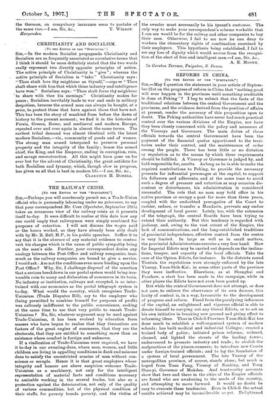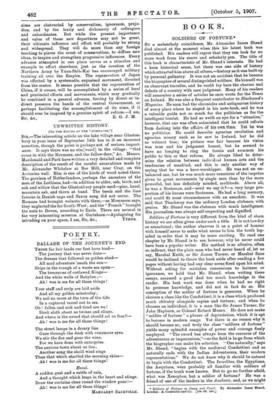REFORMS IN CHINA.
[TO THE EDITOR OF THE "SPECTATOR.'] SIR,—May I question the statement in your article of Septem- ber 21st on the progress of reform in China that " nothing good will ever happen in the provinces until something creditable is done at Peking " P I beg to submit that the facts of the traditional relations between the central Government and the provinces, and the evidence derived from the position of affairs at present, render the accuracy of this proposition open to doubt. The Peking authorities have never had much practical control over the various divisions of the Empire, nor have they been closely concerned with the policy and measures of the Viceroys and Governors. The main duties of these officials towards the central Government have been the payment of the financial quotas apportioned to the terri- tories under their control, and the maintenance of order among the people. There has been little or no dictation or regulation as to the means by which these requirements should be fulfilled. A Viceroy or Governor is judged by, and held responsible for, results. As long as he is able to make the required contributions to Peking, to provide the necessary presents for influential personages at the capital, to support his followers and adherents, and at the same time to avoid such a degree of pressure and extortion as may occasion dis- content or disturbances, his administration is considered successful. The rule that no man may hold office in his native province or occupy a post for more than three years, coupled with the undoubted prerogative of the Court to cashier, reduce, or transfer a Mandarin, prevents any undue development of local power. Lately, too, with the extension of the telegraph, the central Boards have been trying to extend their authority. But this tendency is regarded with jealousy, and, owing to the vast extent of the Empire, the lack of communications, and the long-established traditions of provincial independence, effective control from the centre is very limited. In large as well as in small matters, the provincial Administrations exercise a very free hand. How far Imperial Edicts may be carried out depends on the inclina- tions, temper, and capacity of the local officials. Take the case of the Opium Edicts, for instance. In the districts round Tientsin the regulations were strongly enforced by the late Viceroy, Yuan-Shih-Kai; in some other parts of the province they were ineffective. Elsewhere, as at Shanghai and Foochow, a start has been made in the campaign, while in other places the Edicts have not even been posted up.
But while the central Government does not attempt, or does not care, to enforce the observance of its own decrees, this laxity of control is, in a way, favourable to the development of progress and reform. Freed from the paralysing influences of the capital, an enlightened and vigorous official is able to devote himself to carrying out any liberal Edicts, or to act on his own initiative in breaking new ground and giving effect to reforming ideas. Thus in Chih-li Province Yuan-Shih-Kai has done much to establish a well-organised system of modern schools; has built medical and industrial Colleges; created a trained body of police; initiated prison reforms; widened, cleaned, and lighted the streets of the leading towns ; endeavoured to promote industry and trade ; to abolish the malpractices of the yamen-runners; to introduce new Courts under foreign-trained officials; and to lay the foundation of a system of local government. The late Viceroy of the metropolitan province, of course, stands alone; but much is hoped from Tuan Fang, Viceroy of Nanking, and Tong Shao-yi, Governor of Mukden. And trustworthy accounts show that here and there in the cities of the Empire officials are found who are awakening to the needs of the country, and attempting to move forward. It would no doubt be easy to overrate these tendencies. Even in Chih-li the actual results achieved may be inconsiderable as yet. Enlightened aims are obstructed by conservatism, ignoranoe, preju- dice, and by the laxity and dishonesty of colleagues and subordinates. But while the present importance and value of these new departures may not be great, their ultimate influence and effect will probably be strong and widespread. They will do more than any foreign teaching to pierce the crust of conservatism, to diffuse new ideas, to inspire and strengthen progressive influences. Every advance attempted in one place serves as a stimulus and example to effort elsewhere, just as the creation of the Northern Army by Yuan-Ship-Kai has encouraged military training all over the Empire. The regeneration of Japan was effected by a systematic, organised movement, directed from the centre. It seems possible that the regeneration of China, if it comes, will be accomplished by a series of local and provincial efforts and movements, which may gradually be combined in a general advance, forcing by direct or in- direct pressure the hands of the central Government, or perhaps facilitating the acoomplishment of its aims, if it should ever be inspired by a genuine spirit of reform.—I am,
Sir, so., E. G. J. M.































































 Previous page
Previous page